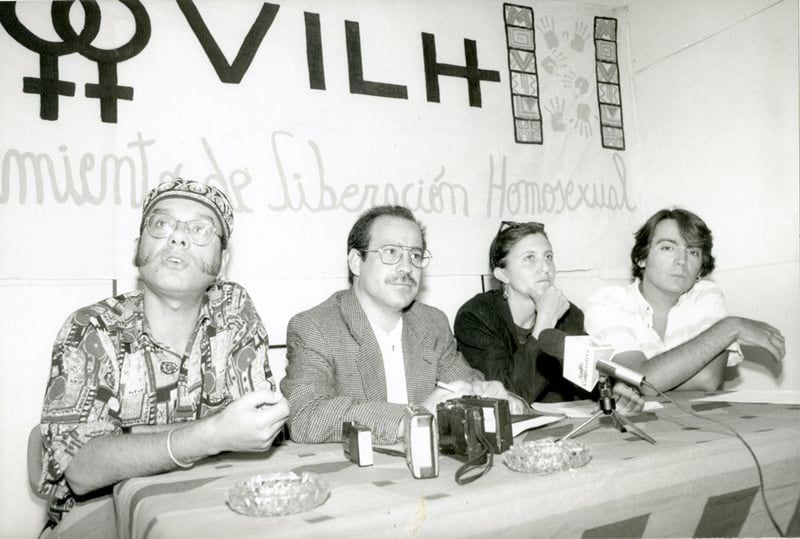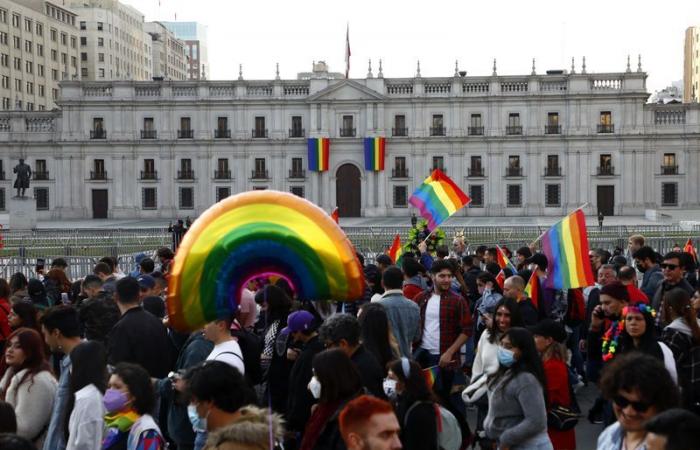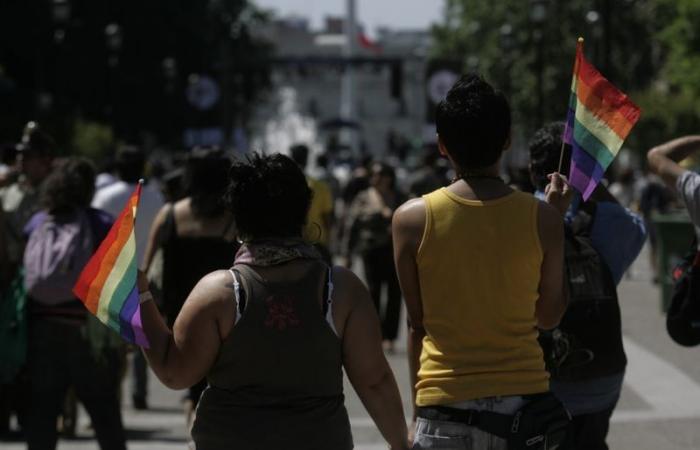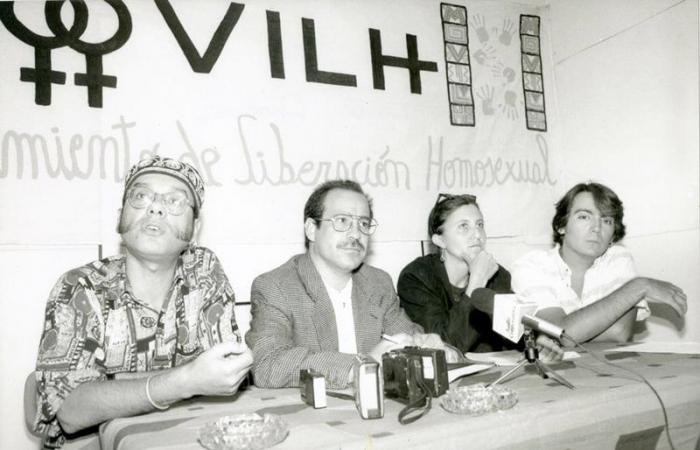In the early 1990s, LGBTIQ+ activism in the Homosexual Integration and Liberation Movement (Movilh) was divided into two strategies: one, led by Rolando Jiménez, which advocated for full legal equality and the elimination of discriminatory norms. The other proposed acting outside the system and avoiding legislative struggles. Jiménez sought to repeal Article 365 of the Penal Code, which severely punished sodomy, which he defined as “carnal relations between two men.”
The first victory came when President Patricio Aylwin introduced a bill in 1993 to repeal this article. However, it would be six years before homosexual relations ceased to be a crime in the country. On July 12, 1999, under the government of Eduardo Frei, Law 19.617 was enacted, which decriminalized homosexual relations between adults. The legislation established that only “carnal relations between an adult with persons under 18 years of age, but over 14” would be penalized.
“When homosexuality was decriminalized, I was 24 years old and had been an activist for six years. When I found out, I cried. I hugged Rolando (Jiménez), who led this fight like Don Quixote,” recalls Ramón Gómez, current head of human rights at Movilh, 25 years later. “I had not yet come out to my family. But I thought: ‘This is the moment,’ because at least now they won’t be able to argue that my sexual orientation was illegal.”
Jiménez, founder of Movilh, recalls that in this rocky legal plan, one of the first tasks was to identify norms and laws in Chile that discriminated based on sexual orientation or gender identity. Article 365 of the Penal Code, in force since 1875, was seen as the main obstacle to the rights of the LGBTIQ+ community, criminalizing them and closing the possibility of any fight for legal equality, he says.
“Although most citizens were not aware of Article 365, they were convinced that we were criminals, dangerous and sick,” Jiménez recalls. This negative perception was so internalized that even within the community there was shame and fear of revealing their sexual orientation or gender identity. “The cultural battle also had to be fought within the LGBTIQ+ population,” Jiménez points out.
Mario Concha, professor at the Faculty of Law of the U. of Tarapacá, says that this article was historically used as the legal argument for the persecution of those minority groups, specifically homosexuals. The law remained in place for more than 120 years, with modifications over time, but always maintaining the basis of punishing relationships between men, he explains.
In 1979, the first significant amendment restricted the sanction to relationships between men, while in 1999 it was established that these relationships were only penalized if the victim was under 18 years old. Despite the progress, the legislation was criticized for being discriminatory and generating legal inconsistencies. “It clashed with other legal concepts such as statutory rape, creating inconsistencies in the application of the law,” Concha points out.
The central criticism was that in statutory rape, if the woman under 18 and over 14 consented, it was not considered a crime, but if a man of the same age consented, it was considered the crime of sodomy.
Finally, Article 365 was repealed by Law No. 21,483, published on August 24, 2022, highlighting the principle of will as a central criterion for determining the legality of sexual relations. “Here, the will prevails, therefore, people will no longer be persecuted for their sexual orientation,” explains Concha.
Carlos Esperguen, a lawyer and academic at the University of La Serena, says that the repeal of Article 365 is seen as a significant advance in LGBTIQ+ rights. “Our country demonstrates its commitment to the international community and to the protection and recognition of people’s rights,” he highlights.
It says that this commitment is also reflected in more recent laws, such as Law No. 21,643 (Karin Law) and Law No. 21,675, which establish measures to prevent and eradicate gender violence. He adds that legal evolution in Chile shows clear progress towards equality and respect for diversity, overcoming a past marked by discrimination and the criminalization of homosexuality.
Psychologist Ariel Cordero Montenegro adds that although in Chile specific studies on the improvement in the mental health of the LGBTIQ+ community after the repeal of article 365 are limited, international evidence suggests positive effects. “It is crucial to continue developing policies that promote equality and well-being to continue improving the mental health of this community,” says Cordero.
She adds that the most positive and significant impacts have been improving the self-esteem and self-acceptance of LGBTIQ+ people in Chile.
He adds that the 1999 legal change eliminated the criminalization of sodomy, reducing the social stigma associated with homosexual relationships, but subsequently, laws such as Law No. 20,609 (Zamudio Law) and Law 20,120 on Gender Identity have strengthened rights. human rights of people, promoting diversity and validating identities in the legal and social sphere. “These legal advances have not only provided protection against discrimination, but have also increased the visibility of human diversity,” says the psychologist.
Following the decriminalization of homosexuality, significant changes began to emerge. Legal challenges expanded to include anti-discrimination laws, civil unions, same-sex marriage, and gender identity law.
Movilh’s social campaigns, with a media impact, promoted a cultural change. A decisive moment was the creation of the First LGBTIQ+ School Brigade in 2004, giving LGBTIQ+ children and adolescents a public voice for the first time. “We were afraid of being arrested, but something was changing,” Jiménez recalls, stressing that the cultural battle had begun to bear fruit.

The support of parliamentarians such as Fanny Pollarolo, Sergio Aguiló and others was fundamental, although they faced stigma for their support of the cause. At the social level, the legal team of the UDP helped to put pressure on the international level, allowing Jiménez to denounce Chile before the United Nations. “Everything was an obstacle and resistance,” says Jiménez, referring to the transversal and internalized homophobia that forced the debate to start from scratch.
Jiménez maintains that the transversality of the dialogue was key. You had to talk to everyone, from the left to the right, and from atheists to religious people. “The value of Movilh’s independence and autonomy was crucial to attracting more adherents,” he says.
The main strategy, he says, was to ensure that the reform package to the Penal Code was voted on as a whole, and not article by article, in order to avoid the possibility of losing in individual votes. In addition, communication campaigns played a fundamental role.
Names of public figures such as Martina Navratilova, Oscar Wilde and Freddie Mercury were made visible, highlighting that in Chile they would be considered criminals. Forums and seminars were held in educational institutions to address myths and stereotypes about sexual and gender diversity, and the media was impacted with real testimonies from LGBTIQ+ people. All this was complemented by a permanent parliamentary lobby.
The activist says that the greatest achievement of this struggle was the decriminalization of a group of people who were previously classified as criminals only because of their sexual orientation or gender identity. This achievement opened the door to future legal changes in favor of this community and significantly contributed to the cultural change towards equality and non-discrimination.
But Jiménez suggests that the long struggle left an important lesson: legal reforms do not magically solve the problems. “These reforms are instruments that, together with principles, values, political will and respect, allow homotransphobic culture to change,” he reflects.
Another lesson, he adds, is the relevance of the independence of the social movement for its achievements. “If we had declared ourselves, for example, left, centre or right, we would never have achieved these achievements,” says Jiménez. The diversity within the LGBTIQ+ community reflects that our demands have to do with the universality of human rights.
Jiménez says that they were not born to change laws or cultures just for the sake of it, “but to improve the quality of life of people whose rights have been violated only because of their sexual orientation, gender identity or gender expression,” she says. These challenges, when they yield concrete and visible results, maintain cohesion and motivation within the movement.
Since 1999, legislation has been crucial to reducing discrimination and violence against the LGBT community in Chile. Before the decriminalization of homosexuality, there was no possibility of passing laws in favor of LGBTI+ rights. “Laws or public policies are not created to protect criminals, and before 1999 we were legally criminals in the eyes of the State,” explains the founder of Movilh.
The post-1999 laws have had mixed effects, but overall they have helped reduce cultural discrimination and encourage LGBT people to report abuses and exercise their rights.
The decriminalization of sodomy removed the legal stigma on LGBTIQ+ people, and subsequent laws, such as the Anti-Discrimination Law and the Civil Union Law, have expanded these protections. With the Gender Identity Law, gender identity and expression were protected, and with equal marriage, homoparental families were recognized. According to the National Health, Sexuality and Gender Survey (Enssex), published in October 2023, 4% of the Chilean population declares themselves to be homosexual, lesbian, bisexual or other, very far from the 0.3% who declared this orientation in 1998. .
Jiménez says that the change has been radical, although the Zamudio Law requires a deep reform. Other regulations have contributed significantly to reducing discrimination. But he insists that “laws do not solve everything; they must go hand in hand with cultural changes.”
One of the main challenges is to deepen the cultural change regarding sexual and gender diversity, facing in time the attempts of anti-rights groups that seek to eliminate the rights already achieved, as well as reform the Zamudio Law, create a state institutional framework against discrimination and the approval of the Comprehensive Sexual Education Law with a human rights perspective.
Strengthening democracy is essential to maintain what has been achieved and continue moving forward. “Without a strong democracy there will be no capacity to defend oneself against injustices and the violation of human rights,” concludes Jiménez.




